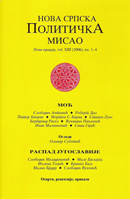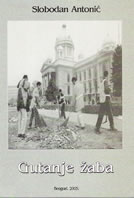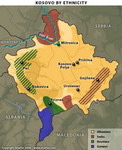| NSPM in English | |||
Kosovo – Consequences of the ICJ Opinion |
 |
 |
 |
| петак, 23. јул 2010. | |
|
(Stratfor, July 22, 2010)
A July 22 ruling from the U.N. International Court of Justice affirmed the legality of Kosovo’s declaration of independence from Serbia. The Kosovar government will use the ruling as a mandate to strengthen its sovereignty over the whole of the country, while the government in Belgrade will attempt to continue its diplomatic fight for Kosovo in the United Nations as a way of winning over nationalists in the country’s electorate. These moves will lead to increased tensions — and possibly violence — in the region. Analysis The International Court of Justice (ICJ), the highest U.N. court, has issued a nonbinding opinion July 22 stating that Kosovo’s February 2008 unilateral declaration of independence from Serbia “did not violate general international law.” The court’s interpretation of the question was narrow, only addressing the legality of the declaration and not of Kosovo’s perceived status as an independent country.
The West remains unconcerned about Belgrade’s complaints on Kosovo because of Serbia’s stated goal of joining the European Union. As long as Serbia seeks EU membership, its continued indignation on the matter will have no real repercussions and will be something the West can continue to ignore.
Thus, whether or not Belgrade’s efforts at continuing the discussion on Kosovo are successful, Serbia’s government has a domestic political logic for continuing the fight, as Serbian leaders see the continuous diplomatic effort on Kosovo as a way to establish credentials with the nationalist side of the electorate. For Kosovo, the ruling is a sign that it can begin exerting its sovereignty more forcefully over the whole of the country. Pristina has had to temper its attempts to press its sovereignty north of the river Ibar, where a substantial Serbian minority — roughly 70,000 — remains. Even very limited efforts by Pristina — such as cutting Serbian lines of telecommunication or establishing a government office in the Serbian part of the divided town of Mitrovica — have elicited violence.
|
Од истог аутора
- The Nabucco West Project Comes to an End
- Remaking the Eurozone in a German Image
- Serbia: A Weimar Republic?
- NATO's Lack of a Strategic Concept
- Surveying Turkish Influence in the Western Balkans
- The Geopolitics of Turkey: Searching for More
- Kyrgyzstan and the Russian Resurgence
- Russia, Belarus, Kazakhstan: A Customs Deal and a Way Forward for Moscow
- Montenegro's Membership in NATO and Serbia's Position
- ЕУ: Убрзано ширење на Балкан
- The Return of Germany
Остали чланци у рубрици
- Playing With Fire in Ukraine
- Kosovo as a res extra commercium and the alchemy of colonization
- The Balkans XX years after NATO aggression: the case of the Republic of Srpska – past, present and future
- Из архиве - Remarks Before the Foreign Affairs Committee of the European Parliament
- Dysfunction in the Balkans - Can the Post-Yugoslav Settlement Survive?
- Serbia’s latest would-be savior is a modernizer, a strongman - or both
- Why the Ukraine Crisis Is the West’s Fault
- The Ghosts of World War I Circle over Ukraine
- Nato's action plan in Ukraine is right out of Dr Strangelove
- Why Yanukovych Said No to Europe

.jpg)








 Summary
Summary The ruling is a blow to Serbia, but it does leave the country an opening Belgrade can claim the narrow ruling means Kosovo’s status is still an open question, one Belgrade wants the U.N. General Assembly to take up in September. But it presents a public perception problem, since the United States and most of the West are already interpreting the decision as supporting Kosovo’s independence and thus ending discussion on the issue.
The ruling is a blow to Serbia, but it does leave the country an opening Belgrade can claim the narrow ruling means Kosovo’s status is still an open question, one Belgrade wants the U.N. General Assembly to take up in September. But it presents a public perception problem, since the United States and most of the West are already interpreting the decision as supporting Kosovo’s independence and thus ending discussion on the issue. However, there are indications from the European Union that Serbia may have to wait until well into the 2020s to join. The question then becomes whether Belgrade’s current pro-EU government will continue in power or whether it will be replaced with a more nationalist one that is less inclined to preserve Serbia’s self-imposed limits on response options to Kosovo’s independence.
However, there are indications from the European Union that Serbia may have to wait until well into the 2020s to join. The question then becomes whether Belgrade’s current pro-EU government will continue in power or whether it will be replaced with a more nationalist one that is less inclined to preserve Serbia’s self-imposed limits on response options to Kosovo’s independence. STRATFOR therefore expects to see the decision embolden Pristina and raise tensions north of Ibar, potentially leading to violence. This will force the Serbian government to reconsider its position of using only diplomacy and potentially force Belgrade to begin considering non-diplomatic ways to support Serbs in Kosovo. Ultimately, the impasse over Kosovo could force President Boris Tadic’s government to reconsider its pro-EU stance, especially if the electorate decides EU membership will have to wait a decade, or potentially longer.
STRATFOR therefore expects to see the decision embolden Pristina and raise tensions north of Ibar, potentially leading to violence. This will force the Serbian government to reconsider its position of using only diplomacy and potentially force Belgrade to begin considering non-diplomatic ways to support Serbs in Kosovo. Ultimately, the impasse over Kosovo could force President Boris Tadic’s government to reconsider its pro-EU stance, especially if the electorate decides EU membership will have to wait a decade, or potentially longer.











